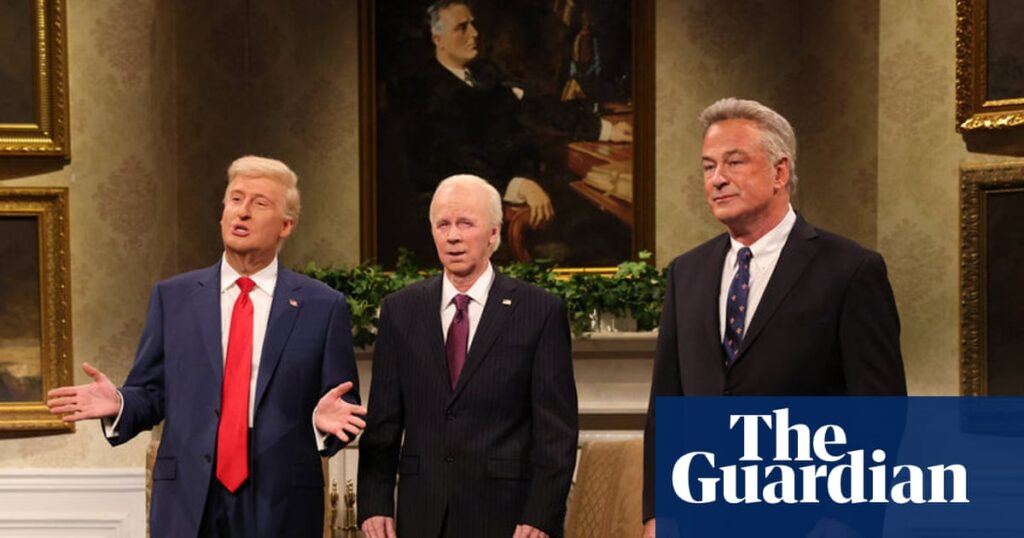
Paul Simon sang “The Boxer” as New York Mayor Rudy Giuliani stood with firefighters, marking a poignant return for Saturday Night Live (SNL) just 18 days after the September 11 attacks in 2001. When producer Lorne Michaels asked, “Can we be funny?”, Giuliani quipped, “Why start now?” It was a moment that underscored the show’s role as a cultural touchstone during times of crisis. As SNL celebrates its 50th anniversary this month, it faces another pivotal moment—not from an external crisis, but from within the realm of late-night TV comedy itself.
In recent weeks, late-night television has become a battleground for free speech and political commentary. CBS canceled The Late Show with Stephen Colbert, citing financial reasons, although Colbert’s outspoken criticism of former President Donald Trump and CBS owner Paramount’s merger negotiations with Skydance raised eyebrows. Meanwhile, ABC temporarily suspended Jimmy Kimmel’s show following his comments on the assassination of right-wing activist Charlie Kirk, sparking a debate over freedom of expression.
The Role of SNL in Political Commentary
As NBC prepares for SNL’s return on October 4, with Bad Bunny hosting and Doja Cat as the musical guest, the spotlight is on how the show will address the current political climate. Stephen Farnsworth, co-author of Late Night With Trump: Political Humor and the American Presidency, describes the upcoming “cold open” as potentially one of the most significant in the show’s history. “In the past, when SNL has faced major challenges, like after 9/11, they’ve risen to the occasion,” he notes.
SNL has a storied history of political satire, with cast members famously impersonating presidents and political figures. From Chevy Chase’s Gerald Ford to Alec Baldwin’s Donald Trump, the show has not shied away from lampooning those in power. Susan Morrison, author of a biography on Lorne Michaels, recalls the tension during Baldwin’s portrayal of Trump, highlighting the show’s fearless approach to political humor.
Challenges and Criticisms
The show’s mockery of Trump has often drawn ire from his supporters and the former president himself. Yet, Farnsworth argues that SNL should not hold back. “SNL will face charges that it isn’t going far enough or that it went too far pretty much no matter what they do, so there’s no reason not to be all in,” he asserts. This sentiment echoes the broader challenge faced by late-night comedy in navigating political sensitivities while maintaining its edge.
Conservatives have long accused SNL of bias, claiming it disproportionately targets right-wing figures. Former head writer Tina Fey acknowledged a “liberal bias” in a 2003 interview, though Michaels maintains the show is nonpartisan. Morrison adds, “It isn’t to say he would ever be an apologist for the Trump regime; nobody could have expected that politics would jump the shark in quite this way.”
Looking Ahead: SNL’s Continued Relevance
As SNL gears up for its new season, the pressure is on to deliver sharp, relevant comedy that resonates with audiences. David Litt, a former speechwriter for Barack Obama, emphasizes the difficulty of writing comedic material under time constraints. “This is a show that rises to a pretty intense challenge every week,” he says, highlighting the unique pressure SNL faces in the current political landscape.
Bill Carter, author of The Late Shift, believes that despite political pressures, SNL’s future remains secure. “Unlike those shows, Trump cannot say this has terrible ratings and does not make money,” he points out. “Saturday Night Live does not have terrible ratings. It’s a tremendously valuable franchise. NBC is not walking away from that show.”
As SNL marks its 50th year, its ability to adapt and remain relevant in a rapidly changing media environment will be closely watched. The upcoming episodes will not only test the show’s comedic prowess but also its role as a barometer of American culture and politics. In an era where comedy and politics are increasingly intertwined, SNL’s response to these challenges will be as crucial as ever.







